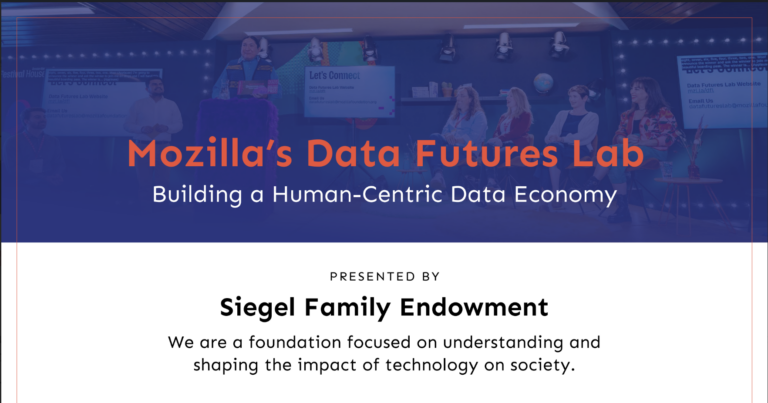The pace of technological change can induce whiplash; from generative AI, to robotics, to bioengineering, to virtual and augmented reality, it seems that there’s always a new innovation. Yet these technological advances are not always accompanied by discussion, regulations, and designs that consider negative impacts or unrealized potentials. At Siegel Family Endowment, we are committed to advancing a vision of technological change that includes and improves the lives of all people.
What is Public Interest Technology (PIT)?
Public interest technology (PIT) is a growing field that offers us a lens for advocating for the development, deployment, and ongoing use of technologies for the public good. It is multidisciplinary, drawing on the experiences and perspectives of a range of people and fields. It intentionally centers the voices of historically excluded communities, acknowledging these groups as critical to correcting past harms and envisioning an equitable technological future.
PIT at Siegel Family Endowment
We believe that strong social, physical, and digital infrastructure is a prerequisite for cultivating an equitable society. Our work aims to make the infrastructure of today and tomorrow work for all people. Our PIT work is a critical inquiry area of our infrastructure focus.
As technology’s role in all parts of society continues to expand, it’s our goal to help everyone become conversant with the technologies that affect all areas of our lives. We work with policymakers, technologists, researchers, educators, and other funders to ensure that the design, deployment, and use of technologies are leveraged in a way that advances the public interest. Our grantees use technology to enhance public institutions, imagine solutions that fulfill unmet needs, and critically examine technology’s impact on civic life.
Featured PIT Grantees
We are excited to share six case studies of grantees who are at the forefront of the PIT movement:
build4good
build4good, an initiative of New America, matches promising college students in technology-related majors with nonprofit organizations that have technology-specific project needs. The program sets students up to participate in paid summer internships, receive mentorship from field leaders, and engage in professional development opportunities, seminars, and social experiences with a cohort of their peers. Participating nonprofit organizations also benefit from the partnership—build4good interns bring expertise, energy, perspective, and capacity to their work; expand employer access to tech talent; and advance the goal of effectively harnessing the power of technology for social good.
The program aims to not only fill a critical need for nonprofits, but to also showcase diverse career pathways for students in technical fields. “This was a way to help students explore different career opportunities,” says build4good co-founder An-Me Chung. The program exposes both students and nonprofit organizations to new ways of thinking about the power of technology, and the potential to harness the power of technology for the public good.
Read the case study on build4good here.
Govern For America
Govern for America (GFA) was founded on the belief that tackling big problems and demonstrating that government can work for all requires bold, equitable, and inclusive leadership in partnership with the public. GFA’s fellowship program addresses a talent crisis in government by cultivating a pipeline of young, diverse emerging leaders to serve in public sector positions around the country. GFA also supports fellowship alumni to continue on a lifetime of public sector leadership.
Octavia Abell, GFA’s co-founder, says that public interest technology initiatives offer an important way of demonstrating how government can positively affect daily life, particularly in underserved communities. “So many of the ways that residents interact with government come through technology initially,” Abell says. “The fellows see public interest technology as a tool for advancing the work and the priorities that they hold closely.” GFA has also recently introduced a new program whose primary focus is on broadband and digital equity.
Read the case study on Govern For America here.
Public Interest Technology University Network (PIT-UN)
The Public Interest Technology Universities Network (PIT-UN) fosters collaboration across more than 60 universities and colleges committed to growing a new generation of civic-minded technologists. PIT-UN members’ activities focus on six field-building areas: experiential learning; student scholarships; incentives for faculty; applying institutional data; prioritizing diversity, equity, and inclusion; and supporting curricula and faculty development. PIT-UN supports working groups, hosts convenings, and offers seed funding to test innovative approaches for developing technological strategies for achieving a public, civic good. In all of its work, PIT-UN advances a vision of public interest technology that is centered on equity and justice.
PIT-UN’s rapid growth is a testament to the urgency within higher education to meaningfully promote and shape the field of public interest technology. The program recognizes the impactful role that academia has to play in advancing the field, but doesn’t insist on a one-size-fits-all approach. Instead, it supports coordinating work between institutions, and respecting autonomy while leveraging network effects.
Read the case study on PIT-UN here.
TechCongress
How can we build capacity in Congress to encourage better, more effective, and more informed policymaking around technology? That question feels especially urgent as advancements in generative AI, new research on social media, and ongoing criticism around digital privacy and security dominate the news. Building expertise and capacity is the primary objective animating TechCongress, a nonprofit organization that recruits and supports technologists to serve in congressional offices through Capitol Hill fellowship programs for early and mid-career technologists.
TechCongress is a nonpartisan organization that aims to elevate technology-related discourse by building expertise and capacity that can advance better outcomes for all constituencies and congressional districts.
Read the case study on TechCongress here.
#BlackTechFutures Research Institute
#BlackTechFutures Research Institute is building a national and global network of city-based researchers and practitioners focused on bolstering sustainable local Black tech ecosystems. The Institute provides actionable policy recommendations and a national public data archive that elevates and connects the work of local Black tech ecosystem builders, Black public interest technologists, Historically Black College and University (HBCU) scientists, Black STEM and computer science practitioners, government techies, and Black church futurists. The #BlackTechFutures Research Institute is housed at Stillman College, an HBCU, and draws on the rich histories of Black community-building and activism pioneered by groups like the NAACP and the National Urban League.
Read the case study on #BlackTechFutures here.
Mozilla’s Data Futures Lab
Data Futures Lab, a project of the Mozilla Foundation, served as an experimental space for developing new approaches to data stewardship between 2021-2024. It provided funding, project incubation, scaffolding for collaboration, convening around emerging ideas, and a place to workshop approaches to data governance. By bringing together innovators, capital, and community, DFL hoped to give greater control and agency to people, rather than corporations or systems. The project has since ceased as a standalone initiative, and its success has inspired the broader Mozilla Foundation to take its approach to funding and tailored support so that more promising sociotechnical projects can flourish over a longer term.
Read the capstone case study on Mozilla’s Data Futures Lab here.
Get Involved in PIT
As a learning organization ourselves, we hope that you will take this as an invitation—to learn from the work of our grantees, and to join with us in understanding how we can support PIT. We’d also like to learn from you, and hope that you’ll share more about your own journey in supporting this important work. If you’d like to have a conversation about our experiences working with any of these grantees, or would like to learn more about our work more broadly, please do not hesitate to contact us, and we’ll be happy to have a conversation.





